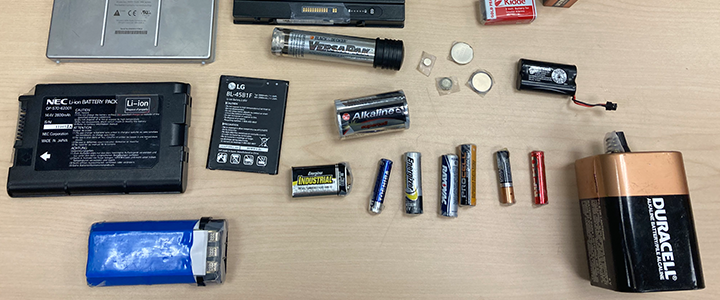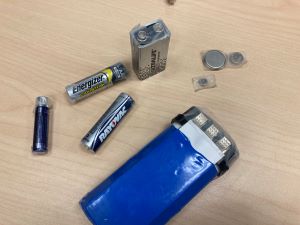
Batteries
There are many different types of batteries including alkaline (AAA, AA, etc.), car batteries, button-cell, lithium (non-rechargeable), lithium-ion (rechargeable) and electric car/bicycle batteries. The average household of two people has 20-60 batteries in their home. Batteries are found in any item that lights up, makes a noise, or moves without being plugged into an outlet. This includes flashlights, clocks, electronic toothbrushes, cell phones, musical greeting cards and light-up shoes.
Some batteries must be prepped a certain way for disposal in the regular household trash. Other types of batteries should not go in the trash and need to be managed as hazardous waste.
Disposal methods depend on the type of battery that you have. All batteries, even used batteries, have the potential to carry a charge and if the terminals touch each other or other metal, it could cause a spark, emit smoke and potentially start a fire. There has been an uptick of fires at solid waste facilities and in vehicles hauling solid waste that can mostly be traced back to improper disposal of batteries, especially lithium and lithium-ion batteries.
You can prevent fires by taping the battery ends with non-conducting tape (electrical, packaging, or duct tape) or separating them into individual plastic bags. These measures will prevent the positive and negative terminals from connecting with each other or other metals. Below is a short list of everyday batteries and the proper disposal methods for each type.

Alkaline
Alkaline are the standard non-rechargeable AAA, AA, C and D cells, and 9-volt batteries. Alkaline batteries can be disposed of in the regular trash. Tape both ends of the battery before disposal!
Pre-1996 alkaline batteries may contain mercury. Mercury is banned from being landfilled or incinerated in New Hampshire, therefore pre-1996 alkaline batteries must be brought to a household hazardous haste (HHW) collection event or permanent facility.
Button Cell
Button batteries are small, disc-shaped batteries commonly used in hearing aids, medical devices, watches, calculators and cameras. Button cells may contain mercury, lithium, silver, nickel and other hazardous substances. Do not throw them in the trash! Check with your local transfer station about disposal options or go to the HHW webpage for information on collection events and permanent facilities. Be sure to tape them first!
Electric/Hybrid Car and E-Bike Batteries
Electric/hybrid car batteries do not belong at your local transfer station. Speak with an automotive professional at a licensed repair shop or salvage yard about proper recycling.
Some e-bike manufacturers offer recycling services through select Call2Recycle drop-off locations.
Wet-cell and Lead-acid (Car Batteries)
Wet-cell batteries are banned from disposal because they contain a corrosive liquid and toxic heavy metals. These batteries are used in vehicles, motorcycles, boats and emergency lighting devices. Most transfer stations, retail locations and scrap metal yards take lead-acid batteries for recycling.
The most common wet-cell battery is a lead-acid battery found in automotive vehicles. They contain lead and sulfuric acid, a dangerous corrosive liquid. Residents can return old car batteries when purchasing a new one, or recycle them at a scrap metal yard, auto repair shop, a HHW collection event or permanent facility, or at select retail locations.
Have a cracked or leaking wet-cell battery? Place it in a container that is lined with a basic material such as baking soda. Never pour baking soda on top of the battery.
Non-rechargeable Lithium
Non-rechargeable lithium batteries (not to be confused with rechargeable lithium-ion batteries) are hazardous waste and should never be thrown in the trash. Lithium batteries, when exposed to water or damaged in any way, are highly reactive and can ignite causing intense fires. They do not all look the same, but they are generally labelled as “lithium” or “Li.” Households should bring them to a HHW collection event or permanent facility.
Rechargeable and Lithium-ion
Rechargeable batteries such as nickel-cadmium (Ni-Cd), nickel-metal hydride (Ni-MH) and lithium-ion (Li-Ion) batteries, contain hazardous heavy metals and should not be put in the trash. Lithium-ion batteries can be found in just about every device on the market today from toys to electronic devices to vehicles. When exposed to water or damaged in any way, they are highly reactive and can ignite causing intense fires. Lithium-ion batteries should never be put in the trash! Most rechargeable batteries can be recycled for free. For information on the battery recycling program nearest to you, visit the HHW webpage for collection options, check with your local transfer station, or go to BatteriesPlus or Call2Recycle.org to find a participating drop-off location.
Remember – if it’s rechargeable, it’s recyclable!
Questions? Need help identifying a battery?
Residents should contact their local transfer station or the NHDES HHW Program via email at hhw@des.nh.gov or by phone at (603) 271-2047. Business owners should contact the Hazardous Waste Hotline at 1-866-HAZ-WAST.
- NHDES Resources for Managing Batteries.
- Call2Recycle Drop-Off Locator for single use and rechargeable batteries, cell phones and e-bike batteries.
- BatteriesPlus Drop-Off Locator for rechargeable batteries, specialty batteries (button cell, key fobs, hearing aids), lighting devices and small electronics.
- Northeast Resource Recovery Association Batteries Toolkit.
- U.S EPA – Used Household Batteries.
*Other drop-off recycling options may be available through other companies not listed here.
Visit our Managing My Waste page to learn about other types of household waste.




